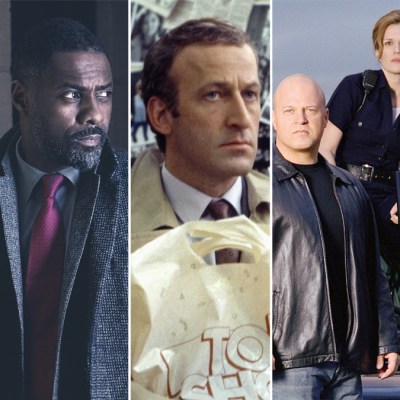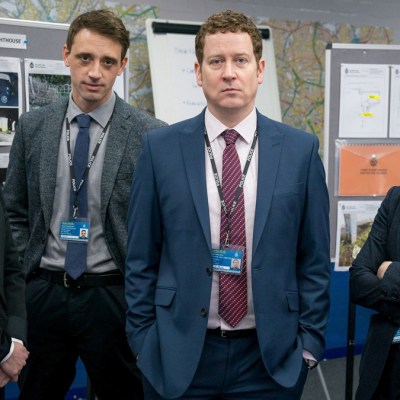Line of Duty: Jed Mercurio ‘We Know There Are People Who Don’t Like the Show’
The creator of the UK’s most-watched TV drama of the century tells us about making the H reveal subversive, cutting scenes of physical intimacy due to Covid, incorporating real-world corruption cases and why it’s too soon to say if Line of Duty will return. Spoilers…
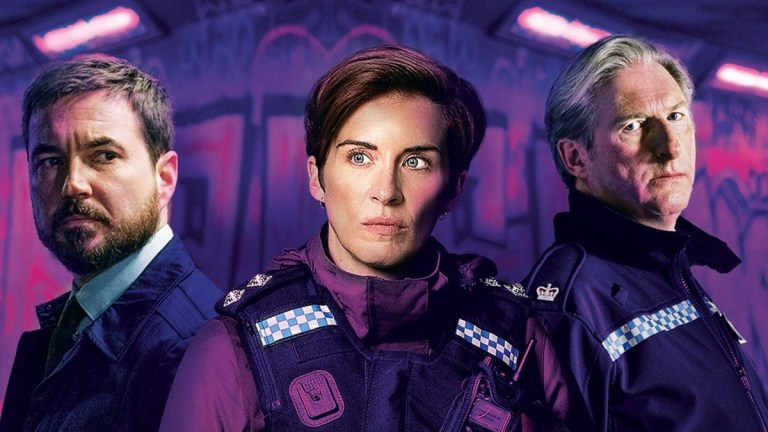
Warning: contains spoilers for Line of Duty series six.
When I tell Jed Mercurio that I felt bereft after the end of Line of Duty, he thanks me and jokes “Well, we do aim to leave people disappointed.” I’m talking about missing the communal viewing experience and frenzy of fan theories between episodes; he’s talking about a well-publicised outcry from some viewers that the finale’s ‘H’ mystery reveal was a let-down.
Speaking on Zoom three weeks after Line of Duty concluded – perhaps for good – Mercurio has answered the finale’s critics his way. On Twitter, he shared Audience Appreciation Index stats on the final series – scores out of 100 compiled on behalf of the BBC Audience Research Unit and used as an indicator of how viewers felt about a particular programme. He won’t argue with subjective reactions, he says, but will confront what he describes as a misleading assumption of how widespread those reactions are. “It’s not just about the show, it’s about facts.”
A former hospital doctor turned screenwriter, Mercurio is exacting when it comes to facts and statistics. He’s an exacting speaker all round, never stuttering, fluffing or lacking an answer, and able to call on a vocabulary that includes terms like “potentiate” and “analogous”. He’s understandably sceptical about the way some press headlines about Line of Duty are generated, and has perhaps adapted his interview style to limit the chances of misinterpretation. The overall impression given is of somebody who, in one of Line of Duty’s famous “glass box” interrogation scenes, would fare well on either side of the table.
The finale hubbub is one story (my view: anyone who was expecting Line of Duty to deliver an upbeat ending hadn’t been paying attention) but first I want to ask Mercurio about protest. Not least in its choice of ending, series six was sounding a klaxon…
It felt like the volume of protest against laziness and venality and incompetence in high office kept getting louder and louder in series six. Is Ted Hastings’ exasperation your exasperation?
That’s a really important question, not just for me but for drama at the moment. Look at the trajectory of our country over the last few years. When you’re doing a drama that’s about institutional corruption, you have an important decision to make about whether you acknowledge that the environment has changed, or you plough on doing something that’s set in an entirely fictional, disconnected world?
For me, I was thinking about the fact that we aired season one during the summer of the 2012 London Olympics when we were a very small, unheralded police drama buried in the BBC Two schedule. Looking back to that time, it did feel like the country was a very different place. To quote L.P. Hartley, it’s like a foreign country, how it felt then in terms of our national pride and the shared experience of positivity.
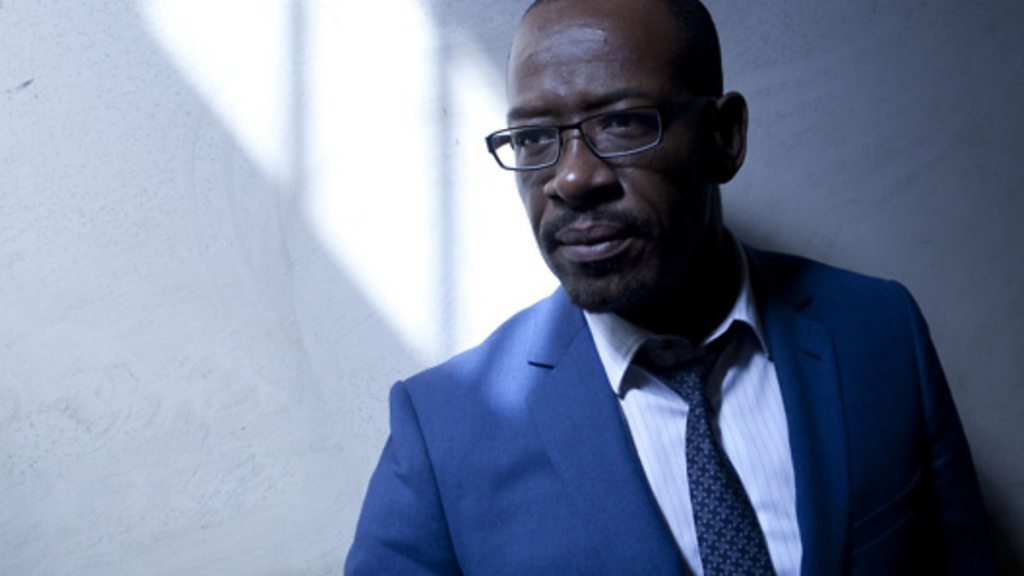
To quote your own words back at you then, what has happened to us? When did we stop caring about honesty and integrity?
It’s a really hard one to answer because there’s obviously no point at which that occurred, it appears to have been a progression towards a system now where very senior politicians can visibly be corrupt – and let’s not use any other word – in a way that I think is new in this country. We’re accustomed to seeing it in other countries, we’re accustomed to seeing reports of big civil contracts being awarded in other countries and lots of money just vanishing going into the pockets of corrupt enterprises. We haven’t seen that in this country before, certainly not visibly.
The answer to ‘when’ is hard to say, but it would appear that the pandemic has potentiated the visibility of that through very conspicuous examples, such as the awarding of PPE contracts to companies that were fast-tracked through favourable relations with the government who didn’t have experience of delivering those products. There are examples of defective products being delivered at huge cost to the public purse.
Filming on series six shut down at the start of the pandemic before restarting under Covid-safe conditions. How did the scripts change during that hiatus? You told Mary Beard that the pandemic had been included in the series in an allegorical way…
The specific answer to the question about allegory is about social distancing. It was about the practicalities of filming, so the physical distance between people. There’s more distance between the characters than the intention was. With the key personal relationships that were portrayed in the season, we did look very closely at how impractical it would be to have physical intimacy involving our main cast. That did affect some of the sequences we wanted to do and some of the personal stories we wanted to do.
Are you talking about Jo and Kate?
I’m talking about the trajectory for Steve and Steph, and Jo and Kate. Those were things that had very specific trajectories, and there were limitations on how we could approach them.
Would there have been sex scenes then, between either of those couples?
If we’d known we were able to do it, we might have had more physical intimacy, but we knew that we weren’t able to do it, so that was just something that we weren’t in a position to explore. There’s no point trying to explore something that you can’t do.
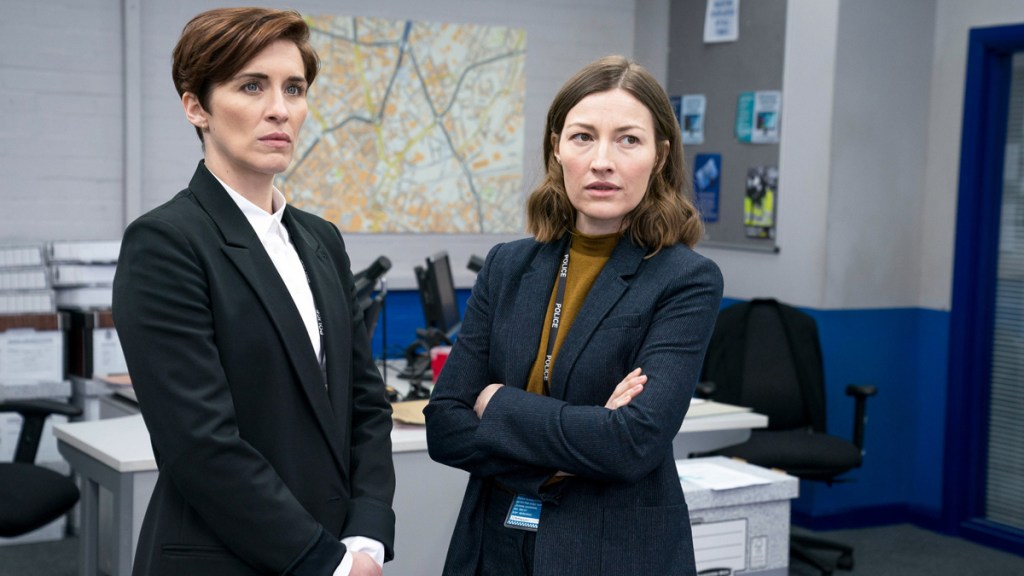
What about script changes in terms of the real-world commentary layered on top of the story? Do you remember the specific circumstances of writing Ted’s line about there being a “bare-faced liar in the highest office”?
That predates the shutdown. The intention to portray the conspicuous corruption that has arrived in our society, and make specific references to individuals who hold high office, or practices that are now visible in high office, was always part of the intention.
How about the ‘Lies Cost Lives’ series tag-line. Did that pre-date the lockdown, or did that come as a reaction to the events of the pandemic?
That came after. The process has always been that we start delivering the series before the marketing campaign starts ramping up. The initial marketing meetings with the BBC post-dated the pandemic, so that’s when we started talking about the possibility of coming up with something which was allegorical in the way that that particular tagline is.
To give you a clear history, we shot four weeks before the shutdown, which was our unilateral pre-empted move. We shut down about a week and a half before the national lockdown, and that was because we saw that we needed to shut down because of Health and Safety. Basically, all the things that were being pointed out to the government and they didn’t act until that later date were things that we were seeing at ground level. Those four weeks related to the first couple of episodes. Then we had the shut down and the scripts were pretty much finished, the only re-writing was about creating a safer environment for the cast and crew, moving more things to exteriors and reducing physical contact between characters.
There was almost a Reithian educational motive in series six’s use of real-world corruption cases. Most viewers might be familiar with the Stephen Lawrence and Jill Dando murder cases, but names like Christopher Alder, Daniel Morgan and Daphne Caruana Galizia would be less familiar. Did you want to use the series as a platform to urge viewers to go away and read up on these cases to find out more?
I’d be very pleased if they did. In terms of how we portray police corruption, it’s hugely important to us that we find ways of relating it to the real world. Otherwise, people will claim that this corruption doesn’t exist, so to be able to identify specific real-world correlates is something that’s been very important on Line of Duty all the way through.
With this season, what we wanted to do was show something about the shape of the careers of public officials in high office, and the fact that people can be involved in things that very clearly involve misconduct and error and negligence and yet still continue into high office. So that was why we looked at things like Alder and Lawrence, Charles De Menezes – who is obviously the Karim Ali connection. There was also a little bit of Blair Peach in the ‘Lawrence Christopher’ case with the murder weapon being lead piping. The police officers who killed Blair Peach had illegal weapons like lead piping in their lockers. And in the identity parade, they all grew beards, which is the opposite of what the identity parade did in our fictional version, where they all shaved and cut their hair.
If you’re looking at the most conspicuous cases of real-world corruption or police failings, we did touch on the most high-profile in the last generation, with Lawrence and Savile and Dando. It’s really about reminding viewers that while Line of Duty is entirely fictional and at times lurches into a very fictional world and a very fictional portrayal of police operations, but the basic idea that corruption exists in our society is not a fiction.
It’s kind of a riposte to [Commissioner of Police of the Metropolis] Cressida Dick’s critique of the show then? A way of saying, ‘you can’t deny corruption exists, here’s the evidence’.
Yeah, I would say that Cressida Dick’s analysis of Line of Duty is analogous to her analysis of corruption in the real world.
Have you read [Michael Gillard and Laurie Flynn’s] The Untouchables book about police corruption in Scotland Yard in the 1980s? Was that an inspiration for Line of Duty?
No, I haven’t read it.
How about the Daniel Morgan podcast that’s referenced in series six? Did you listen to that?
I did.
I don’t expect you’re surprised by home secretary Priti Patel delaying the release of the Daniel Morgan murder independent report?
I am surprised actually, I didn’t see that coming. Obviously in hindsight it does fit with the fact that the repeated failures to properly investigate the Daniel Morgan murder do relate to quite murky relationships involving the press and police officers.
Series six had a valedictory feel, welcoming back so many familiar faces. What explains that sense of doing a final lap, saying goodbye and tying up loose threads?
I think it was because we were looking at the H story. The fact is that it’s something that’s gathered momentum over the seasons and a lot of the things that were fed into it did relate to past characters. The most efficient and vivid way of showing that is obviously to include those characters in the present.
There were some people we didn’t see return. Though we went to HMP Brentiss, there was no sign of Thandiwe Newton’s Roz Huntley, for instance. Were there ever plans to bring back other characters?
No. We’d sometimes talk about it, but we never got to the point of actually writing a script involving past characters and then not being able to include them.
The last time we spoke after series five, you said that “familiarity would potentially be our undoing”. I also read in an interview you gave to Mark Lawson in the Radio Times where you compared the series to an astronomical event whereby something’s gravitational force gets heavier than its mass? Has Line of Duty passed those points now?
I think those are two separate things. The idea of familiarity just relates to the fact that if there’s a lot of Line of Duty, so a lot of episodes and it’s on every year… I’m not saying it wouldn’t be successful, but I think you would see a normalisation of the ratings. People would just know it’s out there and they wouldn’t necessarily make time to watch it. We would then migrate to being more like one of those other shows that are on umpteen seasons that do well but aren’t talked about very much.
The Mark Lawson thing was about the Chandrasekhar Limit, which relates to stellar evolution, stars above this limit will eventually collapse under their own gravity. There’s a lot of legacy with Line of Duty, a lot of past stories and past characters, as we’ve just discussed. You could end up in a situation where there’s a lot of intricate navel gazing about the past rather than dynamic forward storytelling.
So series six could be considered either a finale, or a clearing-out of the past, ready for a fresh start?
I’d say it’s too soon. It’s too soon to draw that conclusion. It could be either of those, or it could be something different.
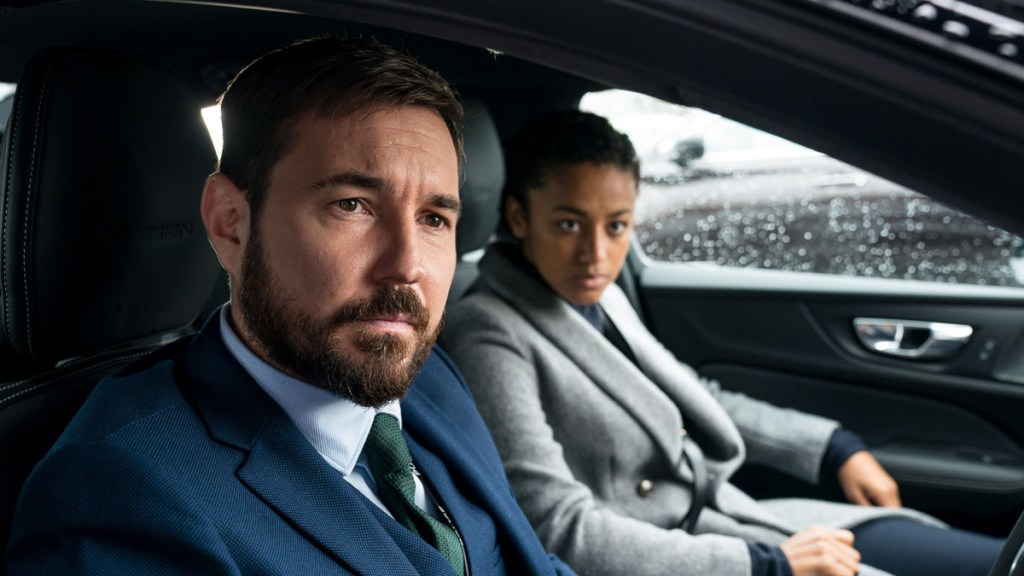
It felt like this series indulged obsessive fans more than previously. A lot of that’s to do with marketing, such as the trailer treasure hunt, but even in the episodes, things like the magnetic letters in Steph Corbett’s kitchen, it felt like there was more of a game than usual being played with a particular tranche of Line of Duty viewers.
We’ve always had an attention to detail and we try to put little Easter Eggs in. You can go back to season two when Lindsay Denton is scrolling through files of missing persons and she sees a brief glimpse of Jackie Laverty and just moves on. The balance we have to strike is rewarding the loyal fans who know the past and the Line of Duty legacy but also serving the new viewers who are watching it in the present with no pre-knowledge.
When you named the character of Chloe Bishop though, you did it in full knowledge that fans would leap to the “preposterous” conclusion – as you described it on Craig Parkinson’s BBC Sounds podcast – that she might secretly be Chloe Gates, the daughter of Tony Gates from series one?
There are some things that might lead you in that direction, but then there are very obvious markers that it’s wrong. It’s just adding to the entertainment value. One of the things that we know about the way the loyal fans respond is that they enjoy the process of analysing and discussing and re-watching. We have a lot of information telling us how re-watched Line of Duty is, so think about how to make that experience rewarding. There are plenty of dramas that don’t bear up to re-watching.
We have embraced the fact that the way that people watch TV now has changed. In the past, people just had one opportunity to watch and writers like me were often discouraged from putting too much detail in because we were warned that the audience would miss it all, whereas now, the audience has the opportunity to go back – if they care, and I’m not saying that they should. Some members of the audience care enough that they go back and re-watch and it gives them a new perspective, so being able to reward them for doing that is part of our responsibility on the show.
When we first heard the phrase ‘runs of homozygosity’ in episode four, it was there and gone. Was that one for the more obsessive fans to pick up on, before it featured in a more accessible, explained way further down the line?
Yeah. We did actually script that scene as going on to reveal what the runs of homozygosity meant. We do that a lot. We make a final decision in the edit, because you can easily take things out but it’s very hard to add them in if you decide after the event that you needed them earlier. There were some people arguing within the editorial team that we shouldn’t have mentioned the runs of homozygosity at all, but I was pleased that we went the way we did.
It gave more obsessive fans something tantalising to consider between episodes while it wouldn’t have impinged on an ordinary viewing.
Yeah, and that was the reason. Because people now have access to online searches, they can look that up straight away. Rather than being something that’s frustrating for people, those who are minded to look them up have the opportunity to do so.
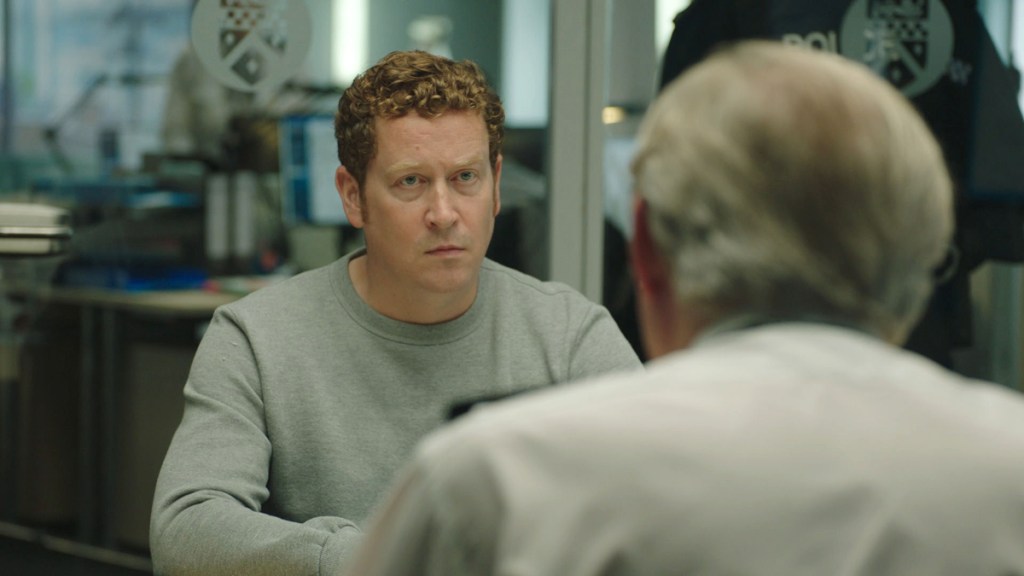
So. Jimmy Nesbitt’s got a good sense of humour then!
[Laughs] Yeah! It was great. The first conversation I had with Jimmy is ‘The whole point of this is you have to lie through your teeth and misdirect’. We thought if that picture is just someone who’s a random guy in Belfast, then the audience isn’t going to get as invested as they would be if it’s a big star. They’ll think, well of course that means that he’s H and he’s going to arrive all guns blazing. Again, it was another misdirect, built around the fact that the intention with season six was that it would be about mystery more than about the jeopardy. The audience’s investment was in the H enigma and not knowing who it was, rather like a closed circle mystery, a country house detective story, revealing who the person is in a way that was most surprising and I would argue most unexpected and subversive.
Job done. You totally got me with Buckells. All the way through I’d been telling everybody he was just a stupid pawn. I remember writing that Buckells only had half of what it takes to be a useful idiot. He wasn’t even on our list of Bent Coppers… When did you know he was the one typing those ‘Definately’ messages in series five?
That was part of our thinking all the way through. You only ever really push the button when you actually come to make sure the actor’s available and you’re going to be shooting. Steps were taken to keep that as alive as possible through season five, because we wanted to be able to point the finger credibly at other people. Going into season six, we made the decision that we were going to reveal H, and then it was a case of how do we make that the most surprising reveal?
There were obviously two ways to go. We could have just created lots of confirmatory information so that by the time we got to it, it was inevitable that it was going to be a certain person, and then the drama would work in a different way. It wouldn’t be so much about who it is, it would be ‘Are they going to catch them?’, which was kind of what we did over two to three seasons with The Caddy. My main thinking was, it was important that we didn’t go the same way that we did with The Caddy and just do a repeat, which is, we make it pretty clear who the bad guy is, and then it’s all about the tension and jeopardy around whether they’re going to get caught or not.
It felt that we’d succeeded so well in maintaining the H mystery that people honestly didn’t know who it was – they had lots of great theories, but nobody was ever able to produce absolutely convincing evidence for one candidate or another. So we went into six feeling that it would function more in terms of the H mystery than the jeopardy around knowing who it was.
Are you a Private Eye subscriber?
I’m not.
Have you kept up with their Remote Controller columns about Line of Duty?
I saw the last one. Someone sent me a screenshot of the last one in two halves. The first half was about references to Johnson and the government and the second half was just a load of complete nonsense about the BBC. It just made me think it’s no wonder these muppets get sued so much.
That column was irked that viewers had roundly taken Buckells to be a straight avatar for Boris Johnson, while the writer thought that your correlates were usually much more specific than that. What’s your reaction to that assumption?
I think he’s a type. Buckells is a type that you can see in a lot of institutions. The person who fails upwards. That’s something we’ve been careful to draw with Buckells all the way through his involvement with Line of Duty. Every time Buckells has to make a decision, he doesn’t make one. The characters who put their heads above the parapet and show their values and say that they are going to make a definite decision end up being diminished by it, whereas Buckells has succeeded by just avoiding taking responsibility for anything. That’s something that is clearly a problem in some of our institutions.
The fact that Buckells leads this double life is not necessarily related to that, it’s more about the fact that we present someone whose corruption has been mistaken for incompetence, and that is something that we are seeing a lot of. As you said earlier in the interview, in terms of more direct references to senior political figures, there are others within the show. The fact that the Chief Constable makes public statements on the record which are outright lies is not what Buckells is doing.
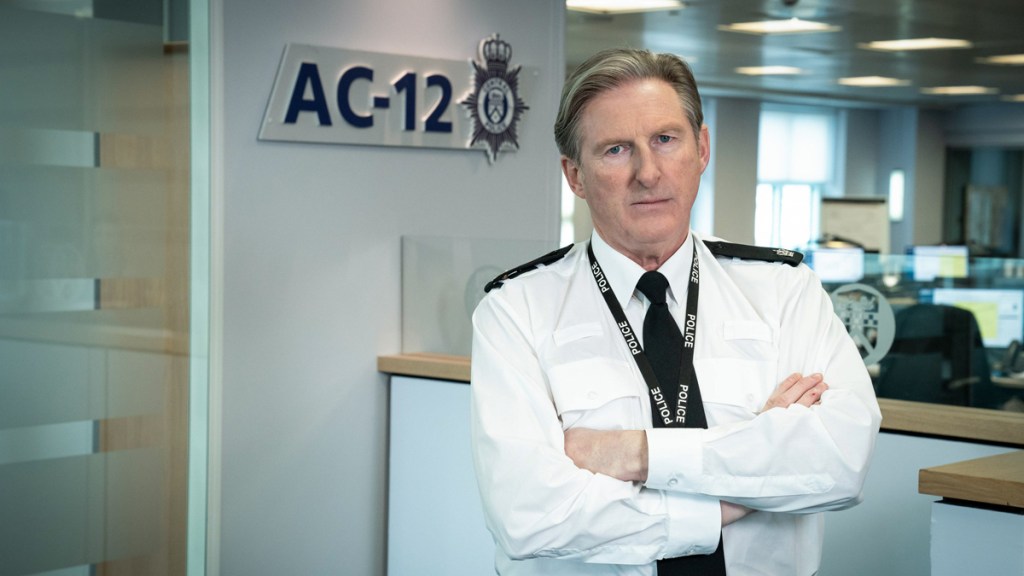
Why did CC Osborne put trackers on AC-12’s cars?
Because as Carmichael said, they don’t trust them.
It’s as simple as that.
[Laughs]
You’ve left CC Osborne as a kind of potentially… he’s like Schrodinger’s corrupt officer, he both is and isn’t bent depending on whether we observe it?
Yeah. I think that if there is more Line of Duty then clearly there’s potential there. He’s someone who retains high office who is an outright liar and has been involved in corruption in the past in terms of the Karim Ali case and the Lawrence Christopher case. Clearly there would be potential there if we wanted to explore it, but it’s too early to say whether we ever would.
Did series six leave you in any tight spots, writing-wise? By making some of those cliff-hangers as exciting as they were, did you burn any bridges?
I think that goes with the territory in Line of Duty. It’s about delivering different things at different times, so the audience doesn’t know what’s going to happen next. There are times when we do set things up and we know there’s an expectation that there’s going to be an action sequence involving lots of jeopardy and we have to deliver on that, and then there are other times where we feel that it’s too predictable and if we keep doing it, it’s going to become kind of like The A Team. You just know they’re going to get locked in a shed with a lot of equipment and then they can just work their way out of it by building an armoured personal carrier with a rocket launcher attached to the top!
It’s about keeping the show fresh. What that does mean is you run the risk of frustrating people who have developed certain expectations about what’s going to happen next. But we’ve been doing that since series one, and some people got frustrated by that, it turned people away and they stopped watching. We understand that it’s not to everyone’s taste and they will stop watching, but what the data shows is that we must be getting something right because the viewing figures and the loyalty of the audience is pretty solid.
You obviously feel quite strongly a need to correct assumptions and misunderstandings about things like viewing figures and audience appreciation figures and so on. What drives your need to explain those things on Twitter? What kind of criticism are you unwilling to take on board?
It’s purely about facts. During the pandemic, amid the tragedy of the incompetent handling of the crisis, we also had the phenomenon of disinformation. We had mainstream media outlets platforming people who were telling outright lies about the virus. Journalists on the payroll of these organisations were lying about the pandemic. I saw how far we’d come in terms of disinformation.
Of course a person can have their own personal opinion about whether a drama worked for them, of course they can, that’s just basic common sense. But the way in which some of that argument works now is to combine that with disinformation or misinformation. Someone puts forward their opinion in a very strident way, and then they add to that misinformation or disinformation by saying ‘everybody agrees with me’. They are both strident and misinforming or disinforming. There’s nothing that I can say or do, or would want to say or do, about their stridency about their own subjective opinion, but if they’re putting forward the idea that their opinion is held by everybody, or nearly everybody, then that is manifestly untrue, and there’s data to prove it. By disclosing that data, I’m just putting it out there and saying that reasonable people will look at that data and it will give them food for thought.
I’m not saying it will convince the hardliners, because then they’ll just come back and start arguing about statistics in a way that makes me think they weren’t really listening in GCSE Maths. That is part of the problem we have in our society. It’s like the guy on Question Time having a rant about what he earns – the guy who earned £80K a year who was just ranting that it didn’t mean he was in the top five percent of wage-earners or whatever percent it was. He just didn’t understand statistics. All he kept doing was ranting that it wasn’t true. That is something that I find frustrating.
As I said, if a person subjectively has a reaction, then of course that’s acceptable and I recognise it and I’m not going to argue with it. We know there are people who don’t like the show, because [laughs] the data tells us there are people who don’t like the show, but what is misleading is the assumption of how widespread that is, and it’s distorted by the way in which people present that information on social media. It’s not just about the show, it’s about facts.
Line of Duty Series 6 out now on digital. Series 6 DVD & Blu-ray + Line of Duty Complete Series 1 – 6 DVD Box set released 31 May.

